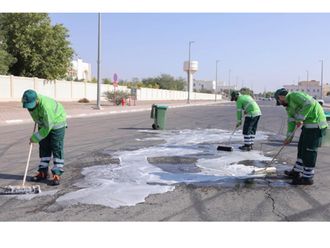
Dubai: Starting from November, travellers will be able to whiz through check-in, immigration and boarding using a single biometric access - their facial print - at Terminal 3 of Dubai International Airport (DXB), it was announced today.
The announcement was made by Major General Obaid Muhair bin Suroor, Deputy Director-General, General Directorate of Residency and Foreigners Affairs in Dubai (GDRFA-Dubai) on the opening day of ‘The International Conference on Policymaking: The Future of Ports’ in Dubai.
The single biometric system of GDRFA-Dubai will be implemented at Terminal 3 of DXB in November, he said, after successful trial runs were held. The project is being rolled out in partnership with Emirates Airlines, which operates out of Terminal 3.
“This is the process of a traveller using the biometric system from check in - passing through immigration, any checkpoints, accessing lounges for first or business class, boarding - until the traveller gets on the plane,” Maj Gen Bin Suroor told Gulf News.
New era begins
He said the paperless airport access system at DXB marks a first for the region - and is among the only ones to be used worldwide.
“We wish the experiment success. We have conducted many trials, and the time for implementation is near - all systems and devices are ready.”
The conference heard experts explain such biometric technologies at airports.
Cosmetic surgeries do not affect the biometric system, especially as it contains various components - iris print, facial print, thermal print, and fingerprints of the traveller.
Also, in case a traveller is headed to a destination that requires a stamp in the passport, he or she can approach the control officer at DXB to get it done.
Impact on travel
The single biometric use will increase the number of airport passengers and eliminate the need for check-in or immigration counters, providing a seamless experience for passengers.
Maj Gen Bin Suroor does not expect the proliferation of biometric systems to impact the number of employees manning traditional counters at airports.
“Airport staff will be present, but their roles will change. They will be more involved in the analysis and monitoring systems. What is required is to raise their skill-sets accordingly,” he said.
About the conference
The two-day Future of Ports conference is being held at Madinat Jumeirah, organised by GDRFA-Dubai.
The event brought together a distinguished group of global leaders, experts, decision-makers, and researchers to strategise and devise a roadmap for crafting policies shaping the future of ports.
Present at the inauguration ceremony were Sheikh Ahmed bin Saeed Al Maktoum, President of the Dubai Department of Civil Aviation (DCA); Lieutenant General Dhahi Khalfan Tamim, Deputy Chief of Police and Public Security in Dubai; Abdullah Al Basti, Secretary-General of the Executive Council of Dubai, and Lieutenant General Mohammed Ahmed Al Marri, Director-General of GDRFA-Dubai.
The conference commenced with an opening speech delivered by Lt Gen Mohammed Ahmed Al Marri, during which he emphasised Dubai’s commitment to upholding the highest global standards of service across its land, sea, and air ports. He reaffirmed that the UAE, and particularly Dubai, stand out for their careful and proactive planning, persistent innovation, foresight in identifying future opportunities and challenges, strategic preparation, and prominent leadership on the global platform. These concerted efforts have effectively revolutionised the tourism and travel industry, reinforcing the UAE’s status as a premier destination in this sector.
Hologram presentation
The conference featured a captivating hologram video presentation that provided an overview of Dubai’s advancements in the field of smart travel and its vision for the future of ports.
The conference’s agenda also included a key session delivered by François Laruelle, Director of ETIAS Division at Frontex, in addition to a panel discussion centred around the theme “Future Challenges and Innovative Solutions”.
Moderated by Edgar Beugels, head of Frontex’s research and development unit (Frontex), the panel including Major General Obaid Muhair bin Suroor, Deputy Director-General of GDRFA, and HE Adel Ahmed Al Redha, Chief Operating Officer of Emirates Airline. They were joined by Tricia Kennedy, acting director, Strategic Transformation Office and CBP One product owner for OFO; Stephen G. Grant, Director of Business Development and Strategic Alliances at Identity Verification; and Miguel Leitmann, Co-Founder and Group CEO for Vision-Box.
The session delved into innovative strategies and technological developments aimed at accelerating border control processes while also maintaining heightened levels of security and safety. The panel also reflected on the escalating challenges brought forth by rising passenger volumes and brainstormed potential strategies to mitigate them.










